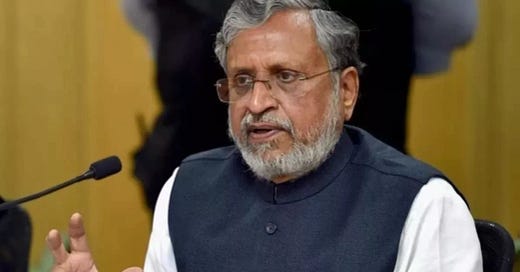A Stalwart of Bihar Politics— with National Impact
Sushil Kumar Modi, the former Deputy Chief Minister of Bihar, passed away on May 13, 2024, at the age of 72, after a prolonged battle with cancer. His departure marks the end of an era for Indian politics, particularly in Bihar, where he held numerous positions of significant influence over the decades. Born on January 5, 1952, in Patna, Bihar, Modi's political journey began as a student activist at Patna University. He was deeply involved in the Bihar Students' Movement of 1974 and played a pivotal role during the Emergency, challenging the constitutional validity of the Maintenance of Internal Security Act (MISA) in the Supreme Court of India, leading to a landmark judgment that struck down Section 9 of the Act as unconstitutional.
Modi's ascent in active politics saw him winning the Patna Central Assembly seat in 1990, a position he retained through consecutive elections in 1995 and 2000. As the Leader of Opposition in the Bihar Assembly from 1996 to 2004, and later as the Deputy Chief Minister and Finance Minister, Modi's contributions to the state's governance were profound. He was known for his sharp intellect, administrative acumen, and unwavering dedication to public service. His tenure as the Finance Minister of Bihar was marked by significant economic reforms and fiscal prudence, which laid the foundation for Bihar's economic resurgence. Modi's relentless dedication to the Bharatiya Janata Party (BJP) and his lifelong commitment to the Rashtriya Swayamsevak Sangh (RSS) were the bedrocks of his political career.
Chairman of the Empowered Committee of State Finance Ministers
Sushil Kumar Modi's role as the Chairman of the Empowered Committee of State Finance Ministers was a cornerstone of his illustrious career. Serving from November 2005 to June 2013 and again from July 2017 to November 2020, Modi was instrumental in the implementation of the Goods and Services Tax (GST) in India. His leadership in this committee was critical during the formative years when the GST Bill was introduced in Parliament in 2010 and underwent rigorous vetting by the Standing Committee on Finance.
Under Modi's stewardship, the committee navigated numerous challenges, including the contentious issues surrounding Central Sales Tax compensation and the finalisation of the GST structure. His diplomatic acumen and ability to build consensus among diverse states were pivotal in advancing the GST agenda. Modi often stated that 80% consensus had been achieved on the Bill, highlighting his effectiveness in fostering cooperation. His tenure was marked by persistent efforts to align the states' interests with the national objective, culminating in the historic rollout of GST—a reform that revolutionised India's indirect tax regime and expanded the tax base.
During his tenure, Modi faced considerable resistance from various states with differing economic interests and political affiliations. However, his ability to negotiate and mediate complex fiscal matters ensured that the committee's recommendations were comprehensive and balanced. He was known for his meticulous approach, ensuring that the GST framework was robust and adaptable to the dynamic needs of the Indian economy. Modi's efforts in the eventual rollout of GST were instrumental in simplifying the indirect tax structure and boosting revenue collection across the country.
A Legacy of Service and Dedication
Sushil Kumar Modi's demise is a profound loss for the political fraternity and his countless admirers. Known for his unwavering dedication to public service, Modi's contributions transcended political boundaries, earning him respect and admiration across the spectrum. His leadership, particularly in the economic reforms of GST, will be remembered as a significant milestone in India's fiscal history.
Modi's personal life reflected his commitment to social harmony and inclusivity. Married to Jessie George, a Christian Keralite from Mumbai, since 1986, Modi was a proponent of unity in diversity, a principle he upheld in both his personal and public life. He leaves behind his wife and two sons, Utkarsh Tathagat and Akshay Amritanshu, who will carry forward his legacy (info from top news outlets).
The outpouring of condolences and tributes from political leaders, party colleagues, and supporters is a testament to Modi's impactful life. His funeral, scheduled for May 14, 2024, will witness the coming together of people from all walks of life to honour a leader who dedicated his life to the service of Bihar and India. Sushil Kumar Modi's legacy will continue to inspire future generations to pursue the path of integrity, dedication, and unwavering commitment to public service.
A Visionary Leader and Reformer
Sushil Kumar Modi was not just a politician; he was a visionary leader whose reformist zeal brought about significant changes in Bihar and beyond. His work in the state's finance sector demonstrated his forward-thinking approach and his ability to implement policies that had long-term benefits. Modi's efforts in modernising Bihar's infrastructure, improving fiscal health, and advocating for economic policies that promoted growth and inclusivity have left an indelible mark on the state's development.
His role as a mentor to many young politicians and civil servants was equally commendable. Modi was known for his accessibility, willingness to listen, and ability to inspire others to achieve their best. His guidance and mentorship have shaped the careers of many current leaders, ensuring that his legacy of public service and dedication will continue to influence Bihar and Indian politics for years to come.
Sushil Kumar Modi's life was a testament to his belief in the power of good governance and his commitment to the welfare of the people. His passing leaves a void that will be difficult to fill, but his legacy will live on in the hearts and minds of those who were fortunate enough to witness his remarkable journey.





